‘How do stay in Thailand forever?’ is a question often asked by expats living in Thailand. Thai permanent residency is the answer to that question. This article will take a look at how you might be able to make Thai PR possible by demystifying a process, that in reality, isn’t as hard as people make it out to be.
Thai Permanent Residency – is it for you?
There are a couple situations where Thai permanent residency is going to be the preferred option for those wishing to stay in Thailand indefinitely. These include:
- You are not married to a Thai citizen, so having Thai permanent residency is a necessary step before being eligible to apply for Thai citizenship*;
- Your current country of citizenship does not allow you to hold dual citizenship. While Thailand and most western countries have no issues on holding dual citizenship (see this article here on Thailand stance ) there a number of countries which won’t let you keep your original citizenship if you naturalize as a Thai. As such, if you want to stay in Thailand permanently, then PR is the best status for you to have.
*If you are already married to a Thai citizen, you can check out our article here on how you can skip PR and go directly to citizenship.
What are the benefits of holding Permanent Residency?
- Peace of mind. Your stay in Thailand is permanent. Your Thai permanent residency does not expire – and only in very rare circumstances – can it be revoked. As such, if you need to take a break between jobs or retire, you can do so without having to find another visa class to let you stay in Thailand;
- No need to do annual extensions of stay, 90-day reporting, TM 30’s or other visa related requirements needed for those on non-immigrant visas;
- You can be registered on the blue house registration ‘Tabieen Baan’ alongside of other Thai nationals, which makes it much easier to deal with government offices, banks, etc.;
- Thai banks are generally happy to lend money to PR’s on the same basis as locals;
- You are no longer required to bring in funds from overseas to purchase a condominium in Thailand;
- You can apply for extensions of stay for your non-Thai family members;
- You are eligible to use the e-Passport automatic gates and Thai passport lanes at all airports and international borders; and
- After 5 years of holding PR you are eligible to apply for Thai citizenship.
Key requirements (hint…you need to be working!)
So, you’ve gotten this far, and you are still interested. Before we go any further, if you aren’t currently working in Thailand, then you probably aren’t eligible for Thai Permanent Residency. That rules out retiree’s, those here on educational visa’s or the Thai Elite visas. However if you are working, then read on…
While there are a number of different categories for applying for Thai PR most of the paths to PR require you to be working for a number of years before you apply.
The rules around PR applications are pretty straight forward, but at the very minimum you will need to be:
- A holder of work permit (and valid non-immigrant visa) for at least 3 consecutive years up to the date of application submission;
- Have been working in the current company for at least 1 year, up to the date of application submission;
- Earn a work based salary at least 80,000* baht per month for a period of at least 2 years, up to the date of application submission, or have been filing tax return for the amount of annual income of 100,000 baht per month for at least 2 consecutive years, up to the date of application submission.
- If married, then you can apply after 2 years of records showing 30,000 baht per month, tax returns and annual extensions of stay.
As said earlier, there are other categories you can apply under (including investment, supporting family, being a recognized expert in your field), the reality is these categories also require you to have consecutive back-to-back work permit and visa extensions and a minimum taxable income. Additionally – the paperwork requirements for these other categories will be higher, and as such most applicants for PR will take the path of least resistance and apply for the simplest category – the one based on work.
Just a note on the income requirements…
I’ve outlined above the official income requirements as they are set out by immigration on their documentation. The truth of the matter is (unfortunately) that based on reports we’ve been getting from people who applied in 2023, immigration isn’t accepting applications from anyone who is earning less than 100,000 baht per month. So in reality, that is the threshold you are going to need to meet.
When and where to apply for Thai PR?
Where to apply is easy – the immigration department handles applications, but like most things to do with PR and citizenship, Bangkok is the place to do it. The immigration office at Chaengwattana has a PR desk staffed year around and they are very helpful in advising potential applicants. This is a link to their website.
When to apply is the tricky bit. For applications to be accepted, the immigration department has to make an official announcement that applications are being accepted for that year – and this is largely at the discretion of the Thai Minister of Interior.
Up until the mid-2000’s, it was common practice for applications to be accepted for a good portion of the year. However, after that point, the window for applications changed to being mainly in December, and very often in the last two weeks of December. In some years, no applications were accepted at all, which caught out applicants who became eligible that year.
For 2023, the government has set the opening dates from the 16th of October 2023 till the 29th of December 2023. This doesn’t guarantee that the same will happen in subsequent years but this has been the past and current governments track record since 2014, where applications will be accepted and processed with some level of predictable regularity.
Which category to apply under?
You’ll note in the application pack you have four categories to apply under:
- Investment
- Work
- Humanitarian/family
- Expert
Straight out of the gate – if you can, aim just to apply under the ‘Work’ category. In many ways this is the easiest of all categories to apply under and the documentation required the most straight forward. That category is all about the applicant, YOUR work history, YOUR income, YOUR education etc etc. Its largely uncomplicated.
‘Investment’ and ‘Expert’ categories are notoriously difficult…
For the most part – forget about applying under the ‘Investment’ or ‘Expert’ category.
Why you may ask? Basically because both these categories contain the same basic documents needed under the ‘Work’ category, plus a huge array other documents which take the whole vetting process to another level. Administratively, it is incredibly frustrating for both the applicants, and the officials themselves. This is particularly true for the ‘Investment’ category.
The ‘expert’ category can also pose some challenges. While technically it doesn’t require you to have a minimum income (presumably so academics working on low salaries at Thai universities can apply) we have been told immigration do want to informally see some proof of income above the proscribed thresholds you see for other categories.
The designation of ‘expert’ can also be a little contentious, and in some cases open to interpretation. At a minimum it requires a very senior ranking C-10 ranking Thai civil servant from a government department or State Owned Enterprise to write a letter attesting to your level of expertise, which isn’t easy to get. Informally too, immigration seem to have their own internal interpretations of what an ‘expert’ may be. So if you can, try and keep it simple.
Applying under the family category has its pros and cons.
For those who are working here with Thai families, you may find that despite your wanting to apply simply under the ‘work’ category, they will push you to apply under the ‘family’ category for Thai permanent residence. This has its pro’s and con’s.
The biggest ‘pro’ is that those with a Thai spouse will have the fee for applying halved. The biggest ‘con’ is that documentation about your spouse, their income and background will be needed. It also requires you to undertake DNA testing to prove your relationship with your children.
That said, anecdotally, we have heard that immigration seem to prefer family applicants as having a family shows that applicants have genuine roots here in Thailand.
The cost?
- There is a non-refundable application fee for 7,600 baht, when you formally submit your application.
- If successful, you’ll be required to pay 191,400 baht. However for those with a Thai spouse, or applicants under 20 who has a parent with Thai citizenship or PR, then the fee is 95,700 baht.
nb: now you know the fees, for those who are married to a Thai spouse, at this point you may want to reconsider PR and instead apply directly for citizenship which only costs 5,000 baht and can be done all year round.
Do I need a lawyer to help me with my Thai PR application?
This is a contentious issue, but our answer is an unequivocal ‘NO, NO, NO’. Someone who can act as an assistant, by all means, but beyond that, lawyers are a waste of time.
There are many reasons for this, which we outline in our article HERE. Ignore this advice at your own peril.
There are many who will disagree with this – ‘I am too busy’ is the common refrain.
Our answer to that is this: the fact is applying for Thai permanent residence (or citizenship, for that matter) involves quite a lot of personal involvement on the applicants behalf and face time with the officials anyway. There is no way around it, and it is a function of how the Thai civil service operates.
Documents required to apply for Thai PR
We won’t bother outlining ALL the documentation needed for the application, as they are comprehensively outlined in this link (in Thai only) and in the announcement issued by immigration in October 2023 (in English here). Needless to say, you will need to provide a range of documentation confirming your work, visa, tax and educational history, as well as other documents from your home country, such as criminal background checks.
There are some documents which will require a little extra effort to get…
We’ve also got a separate article titled ‘Tips and Tricks for preparing PR Applications” where we go through how to get your hands on some of the documents you’ll need for the PR application as well as some strategies for getting your hands on them.
So I want to put in an application, what now?
Four words: Head down to immigration!
Four more words: And do it early.
We strongly recommend that before you apply, you go down to the PR desk at your immigration office and discuss your case with them. By ‘early’ we mean, going in June of the year you want to apply.
They are generally less busy that other immigration officials and by all accounts are very helpful in guiding applicants on putting in a successful application and organizing all the right documentation to support it – if they go well ahead of the formal application window.
We’ve received many reports of people leaving it till late December and being caught out on certain pieces of documentation being incomplete – and in recent years, the harried immigration officials have been ‘less than nice’ to those who have left their application to the last months.
Building a rapport with the PR desk
So when you first head down mid year on an ‘research trip’ to the immigration offices to ask about PR, bring down ALL your documents. The people at the PR desk will likely hand you a list of documents to go off and get, but its better to have already downloaded them and come to see them at least knowing about the process and being semi-prepared on your first visit with as many documents that you can gather at that point in time. The more the better will always stand you in good stead.
Be warned however that these officials will be very hesitant to accept an application which they know will have little chance of being accepted by the consideration committee. If they think your application is premature, they may counsel you about perhaps holding off your application until a subsequent year.
Assuming they haven’t told you to come back next year, the PR desk at immigration will want to do a quick assessment of your documents. They will guide you on what is missing, as well as what might need to be re-done, or have signed off by either different government departments. It might take two or three more trips down to see them before they are happy to accept a formal application, but you’ll notice them becoming more co-operative on each visit as they get to know you and understand you are serious about making the application.
After your second or third visit, so long as your documents are taking shape, you’ll likely have a more senior PR officer come over and review the documents for a final once over. If you’ve gotten to this point, then you know you are nearly there.
The upside of this is that, for the most part, if an application is accepted, then you can feel confident, other things being equal, that so long as your bona-fides check out, eventually getting Thai PR is a likely outcome.
You’ll need to speak passable Thai
The level of Thai needed to pass the PR interview is an intermediate conversational level of Thai. It a couple of notches higher than ‘taxi Thai’ or what you’d use in ordering food in a restaurant. When you go down to the immigration desk to inquire they will be already assessing your Thai language level and will question you mostly if not all, in Thai.
If you are confident in handling your inquiry with them in slowly in Thai and talking about yourself for 10 minutes to government officials, then you’ll likely be at the level you need to be. Don’t worry of you don’t know arcane or complicated legal terminology. But you should be making sense in your conversations with them, and you’ll definitely need to show you understand the process.
The offical PR interview
A few months after your successful application being lodged, you’ll receive notice to attend a formal interview at immigration, normally around March or April the following year. The format is fairly standard year to year, and will consist of a panel of 7-10 officials from various related ministries, who will make recommendations to the Minister of Interior who ultimately signs off on each application.

The format largely consists of semi-formal chit-chat (all in Thai) around your background and why you want to remain in Thailand. For anyone who has spent a few years in Thailand, this stage won’t be daunting. The whole process is as much a Thai language skill check as it is to let the officials take the opportunity to ask you about any lingering questions they may have about your application, though by this stage, there shouldn’t be many questions as the people at the PR desk are generally quite thorough in ensuring your application is self-explanatory.
The whole meeting will be filmed, and with any luck, will only take 5-10 minutes if they don’t have too many questions (which is generally a good sign that the paperwork speaks for itself!).
The Ministry of Interior Black Hole
Once the application is accepted by immigration, and your interview has been completed, it will be sent off to the Ministry of Interior for the formal approval of the Minister. At this point, like Thai citizenship applications, the approval process becomes more obscure, given that it is totally at the discretion of the minister of the day to sign Thai Permanent Residency approvals. In the mid 2000s till about 2013 under civilian governments, approvals took years, sometimes up to 5 or 6 years.
In the era of the military government, the Minister of the day (who happened to be an Army General) was pretty good at making things happen. The backlog of PR and Citizenship approvals has been dealt with, and we know based on anecdotal evidence that approvals were coming through about 18-20 months following your first application.
Since the election of the current government, things are again up in the air. While we know that PR applications have been accepted and applicants are being formally interviewed and processed, whether the civilian Minister actually signs off on the PR applications in the ‘normal’ 18-20 month time frame remains to be seen however.
The one upside from the black hole…(and its a MASSIVE ONE)
Despite the uncertainty which comes from not knowing when your application will finally be approved, there is one huge upside. While you wait, you will normally be asked just to stay on your current work permit and visa. However, for whatever reason, if you lose your job, or decide to quit, people waiting for PR automatically will be given an extension of stay every 6 months while you await the outcome of your application.
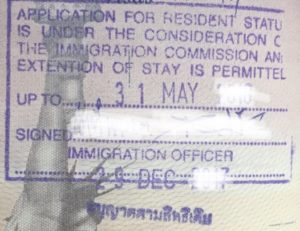
The picture on the above is an example of the 6 monthly extension, and while you are waiting for you PR to be approved, you will need to keep getting this extension of stay stamped in your passport every half year. So if the government or minister are less forthcoming in granting PR on a regular basis, your stay in Thailand won’t be affected until a decision is finally made.
So really, are they going to accept me?
The honest answer is probably ‘yes’, so long as you’ve done the things migrants normally do when they move to a new country – work in a decent job, contributed though paying taxes, and picked up enough of the language.
Unlike citizenship, there is no publicly available points system which you can check your skills and background against. Having said that, we do understand there is an internal points system that the immigration officials do use, which give preference to higher income/tax payments, time spend in Thailand and language skills.
If you are interested in understanding what the officials look for when you are applying for a permanent visa, you could do worse that checking out what they look for when applying for citizenship (see here). We stress though, only use this as a guide, as it isn’t the criteria immigration use to assess your PR eligibility.
Based on lots of anecdotal information however, you stand a pretty good chance of being accepted for PR if the following apply to you:
- Meet the income, tax and visa thresholds outlined above;
- Have a decent educational background and/or have a reasonable skill set;
- Speak, at a minimum, polite and passable Thai for the interviews with the immigration department and be able to explain your background and current situation with them;
- Have shown a reasonable commitment to Thailand in terms of work history, family or other activities;
- To be able to show that you genuinely intend to make Thailand your home.
I work for myself, do I have a chance?
If you are working as an employee for a mid-sized to larger company, Thai or foreign, your chances of gaining Thai PR will be pretty good.
However, we understand that many people work for themselves, via their own companies which are essentially small businesses. This need not be a hindrance.
We understand unofficially that immigration will consider self-employed applicants whose company’s have a paid up capital exceeding 2 million baht, though some reports say this is 5 million baht. It is also fair to say that they will be looking applicants who’s own companies are legitimately trading profitably, with a good track record over a number of years. Immigration officials will want to examine your company documents, and will see through (and reject) applicants who have set up a company simply to get the work permit, PR and citizenship.
If successful, what happens next?
Once the Minister of Interior signs off on your Thai permanent residency application, immigration will invite you back where you will receive your approval letter. After paying your fee, you’ll receive detailed instructions on how to obtain a blue ‘Certificate of Residence’ book. Once you have obtained this, you will be directed to your local police station where you’ll be given a red ‘Alien Registration’ book which only needs to be renewed every 5 years for a minimal fee at the police station. From then, you’ll be allowed to register on a Blue Tabieen Baan at your local district office.
Traveling with Thai Permanent Residency
One of the peculiar aspects of having Thai permanent residency is that while your permission to stay in Thailand never expires – this is only the case if you never leave the Kingdom.
To travel, you must apply for what is known as a 1 year ‘non-quota Immigrant’ re-entry visa. These come in single trip (1,900 baht) and multiple trip (3,800 baht) and is stamped into your passport. In addition, you’ll need to apply for a one year endorsement of your Residency Book (1,900 baht). Without these, your PR will lapse upon exit and there is absolutely no way to get it back again without going through the whole application process again. Similarly, if you stay outside of Thailand for more than 1 year (364 days to be precise) and arrive back after the expiry of your re-entry permit, you will not be allowed to enter Thailand as a PR, and your status is lost in this case as well.
While this isn’t ideal, it is the legacy of a law which was written in 1979. Most PR holders simply automatically renew the re-entry permit and residency book annually to take into account any potential travel and minimize any hassles.
Myths, Misunderstandings and Misconceptions
Myth: Thai Permanent Residency isn’t really ‘PR’ as you need to reapply for a visa each year.
Reality: Not true. Once granted PR, you never have to apply for another visa if you never leave the country again. A re-entry permit is all that is required so you can travel in and out of Thailand without losing your PR.
Myth: The limit of 100 successful applicants per nationality per year means that you’ll never be eligible.
Reality: While it is true that there is a cap of 100 applicants per year, the reality is that most nationalities will never have that number of applicants for PR. The only nationalities that we are aware of which may get close to hitting that number are Chinese and Indian applicants.
Myth: You need to be a well-connected high-flier.
Reality: Far from it. In the nicest possible way, many people who have PR are normal people you’d meet back home who have pretty normal jobs but who have decided that Thailand is going to be their home. People range from academics, small business owners, journalists, educators, and yes, high flying senior execs.

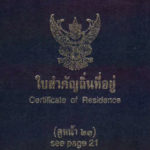
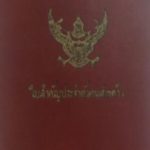
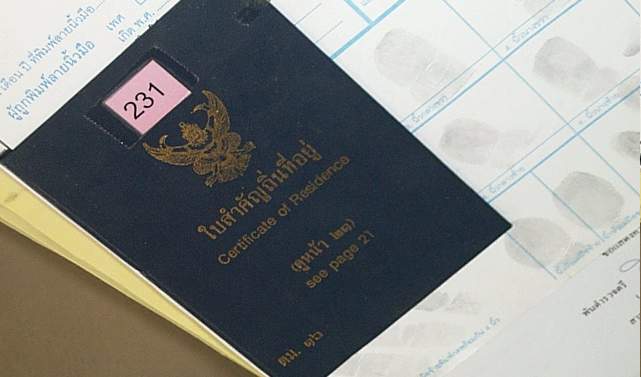
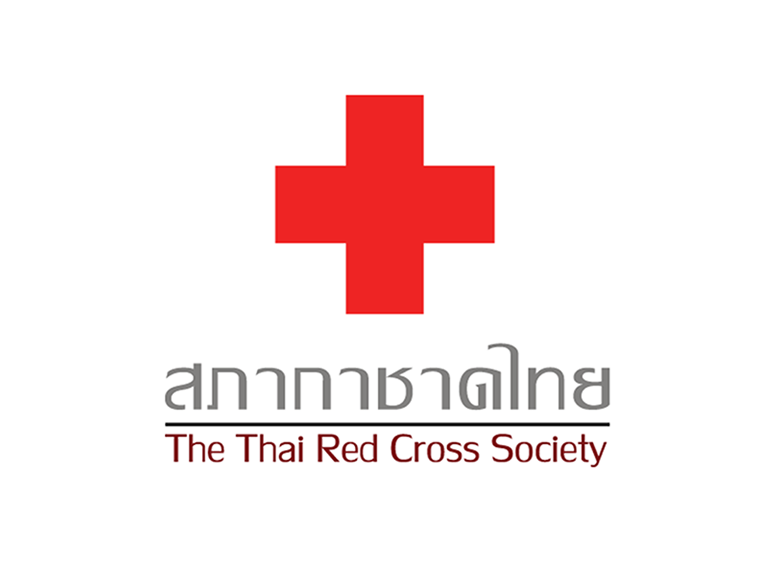

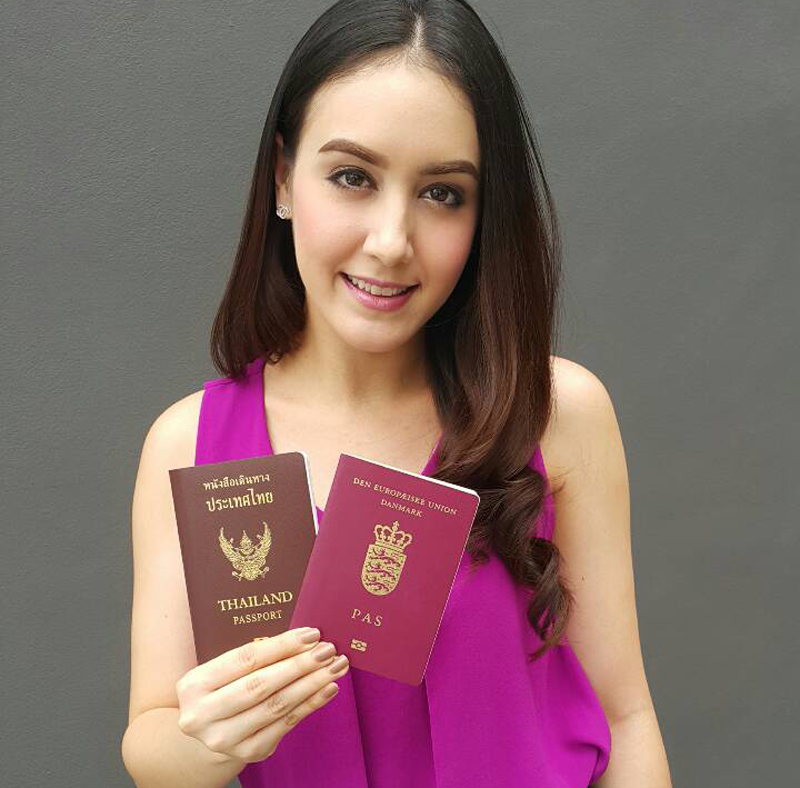



The one year endorsement of residence – is this done at same time as reentry permit or a seperate process? If seperate- where is this done?
Hi there – there is no one year endorsement of residency. One you have PR, it is for life. You will need to check in at your local police station once every 5 years to re-validate your residency booklet (again, this is only your booklet you a renewing, not your PR).
Re-entry permits are done at the PR desk at Chaengwattana where you applied for your PR. These re-entry permits are valid for one year and allow you to re-enter Thailand as a PR.
But if a foreigner has been married to his Thai wife for 38 years and has lived permanently in Thailand for 12 years as a pensioner, does he have any benefits?
Unfortunately no. While being married to a Thai citizen gives you the right to skip needing PR, you still have to be working for three years for a Thai entity before being able to be eligible to apply for Thai citizenship.
Hi, any applicant (2022) received a letter or a call yet regarding result of application ? I still didn’t get any new so I’m a bit worried and I’m not sure who I can contact to have information.
Hi there – you won’t have. The latest citizenship grants were from those who applied in late 2019, early 2020. There is a backlog developing under the new government.
Hi, I’m not talking about citizenship application, I applied for PR. My colleague who applied end of 2021 received the result in February 23.
Ah, my apologies. No, I haven’t heard anything yet for 2022 applicants. Given this is a new civlian government, we are unsure of how they will handle PR application approvals. As you probably know the military government approved them annually but if history is a guide, civilian governments aren’t so routine. I hope I’m wrong to be honest, but if we don’t see any approvals in the next month or two, then I think we will have an answer.
I know for a fact citizenship applications are not being addressed under this government.
Ouch doesn’t sound good. Thanks for the reply. I’ve been trying to call chaeng wattana but it’s mission impossible to get someone on the phone. I’ll update my comment if I can get any news.
no worries. Fingers crossed for you!
Good morning. A bit of good news, my colleague went to CW yesterday to renew his re-entry visa for his PR. He asked the PR staff about the 2022 applicant and they said that for my nationality (French) there is no problem but they just don’t know when they will call us (they are probably waiting for PM signature process).
Hi Arnault, thank you for the report!
Yes, 2022 applicants might have to wait a bit longer. I’m not sure this government will be approving PR applications in the normal 18 month cycle like the last government did.
Hello! Thanks for all the useful & detailed information. I am planning to apply PR end of this year. If I secured PR, do I still need to apply work permit like a foreigner please if to work in Thailand?
hi there – yes, a WP is still very much needed if you want to work but there are some expedited steps once you are a PR. Of course, if you chose not to work that is not an issue too and does not impact your PR once you have it.
Good luck with your application.
Hello, Wondering if you can help with this question; I am self-taught and was offered job right after high-school so didn’t go to university. I have had a good carrier including c-level positions at my country’s biggest company in my profession. I did 3 years of business degree education after work about 20 years ago and obtained a bunch of ECTS points but not enough to be a bachelor degree. Is there any way to translate those ECTS points into something in the Thai education system? Or should I just go with my high-school education when applying for PR? TIA.
Hi there – good question. There’s been people who have applied and have had work specific accreditation counted, which while not formal degrees, were essential counted as such.
While I’m not sure if your partial credits qualify you for anything else (eg a grad dip?) or if you’ve got any other types of mini qualifications, but if you do it would be worth taking them to the PR desk and chatting with them about it. They may decide to count them as a undergrad equivalent, but you will need to explain.
Remember too that the PR is based on an unpublished points system. It will be a combination of income, job description, seniority, how long you’ve been in Thailand (your links), charity donations and language skills which go into the mix. So if you score highly in these other areas – or at least some of them – then it’s unlikely that not having a ‘proper’ degree is going to matter.